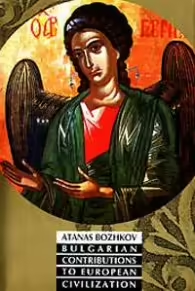Bulgarian Contributions to European Civilization

| Издателство: | Булвест-2000 |
| Брой страници: | 424 |
| Година на издаване: | 2003 |
| Дата на издаване: | 2003-09-03 |
| ISBN: | |
| SKU: | 7973990007 |
| Тегло: | 2407 грама |
| Корици: | ТВЪРДИ |
| Цена: | 90 лв. |
The Mythological Perceptions of the Bulgarian People as Reflected in Fine Arts
It could be said that medieval man reared many diverse species of demons either for reasons of necessity or because he felt lonely and abandoned. The destruction of the ancient value systems resulted in the disappearance of many of his old "guardians", and his gods retreated further into the heavens. The demons which existed in so many Eastern cultures, in the pagan temples or in the back yards of the developed religious cults, suddenly found themselves without their familiar masters. They escaped from the ideological control of discarded myths and were suddenly able to multiply and enter into unexpected forms of intercourse with one another. They hid behind the paradoxes of medieval philosophy, behind the revelations of the apocalypse, behind the fear of the unknown, behind the sufferings of those who had been witness to Attila the Hun, "The Scourge of God on Earth", or behind the mass illiteracy of wide geographical areas. When he learnt to read and write and returned to the pages of literature, medieval man bound his destiny even closer to them. He then turned his attention to the cross of the crucifixion and to images beneath it or in other words to Christian iconography, which the church managed quickly to systematize, but the powers which had entered his consciousness as fairy tales, folk inventions, fears and sympathies were pursuing him unrelentingly. Initially he tried to regain control of these wild demons, by disciplining them within the networks conveniently reproduced in woodcarving and sculpture or book illustrations, thus enchaining and restricting them. The demons, however, put up an aggressive and animated struggle. They dramatically went on the offensive, biting their own tails, tearing down and breaking the sticks and branches branches which held them captive. The struggle between fears and voluntary reconciliation on the one hand and a frightened imagination on the other, underwent one of the most interesting artistic transformations. It was manifested in quite an unexpected and complex manner in the innumerable manu scripts of Carolingian, Irish, Romance, Gothic and even Renaissance literature, albeit at times veiled, in the same way as it manifested itself in the manuscripts of the Eastern Orthodox nations with similar artistic results. It is possible to assert that over an extended period of time the ancient traditions were latent in Christian artistic systems, and that the symbolism of the religious compositions themselves reveals evidence of a pagan past. /…/” Prof. A. Bozhkov
.
.